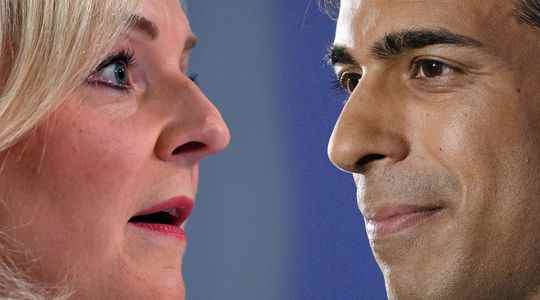Will we ever know what tipped the hearts of Conservative MPs in favor of Liz Truss rather than Penny Mordaunt, yet the favorite to compete against Rishi Sunak in the Conservative Party final? The lavallière collar, some would say. It is true that Liz Truss, who never misses an opportunity to appear in the same clothes and postures as Margaret Thatcher on television, in Parliament and on her Instagram account, will have played the score of the classic pure juice conservative, good dyed. With 113 votes against 105 for Penny Mordaunt, Liz Truss will therefore face Rishi Sunak (137 votes) for the Tory grand final and a place in Downing Street. The winner will be announced at 12:30 p.m. on September 5, the day parliamentarians return from vacation.
Until then, the two candidates will engage in a merciless battle to win the hearts of the decision-makers, the some 160,000 party members in the country’s 650 constituencies. Because after the pre-selection made by the 357 conservative deputies, the final decision falls to the members grouped in local associations. “It’s a beauty contest,” sums up former minister Rory Stewart, candidate for the Conservative leadership in 2019 against Boris Johnson. And to win it, “you have to have spent years touring the federations, swallowing tons of rubbery chicken and smiling at everyone in order to charm the members”, explains Anna Soubry, a former Conservative and pro-European minister who quit the Tories in 2019 over Brexit. “Sunak’s problem is that for the past two years he has not been able to travel to the regions due to the pandemic. Liz Truss has years of experience in this type of seduction operation. .”
It’s not just experience, which is crucial, that works in favor of Liz Truss. His program, made mainly of tax cuts, particularly appeals to the inserts of the country who are “much more conservative and on the right than the average Tory voter”, according to Anna Soubry. A good half are males over 60 and live in Greater London and the South West of England. They represent only 0.3% of the total population, but they will choose the next Prime Minister. The reason lies in the nature of the British system: parliamentary and not presidential. The last party to win the elections (December 2019) chooses the Prime Minister.
“Dirty Politics”
The Mile End Institute at Queen Mary University in London published an in-depth study in 2018 of Conservative Party insiders. The director of this study, Professor Tim Bale, author of Footsoldiers: Political Party Membership in the 21st century, believes that they have not changed, but that they can reserve surprises. “Almost half are not activists, far from it. They will be influenced by what they read in the newspapers.” Precisely, this detail risks encouraging each side to play “dirty politics”, in other words to counter the other by all means, including washing the dirty linen in public. Will Liz Truss’ supporters discuss Sunak’s fortune and details of his tax status?
Rishi Sunak’s supporters have already recalled that before being an ardent Brexiteuse, Liz Truss was an ardent pro-European. That before being Tory, she was a Liberal Democrat. And that she was even against the Monarchy. To this, Truss supporters retorted, in a phrase that will stick: “Liz is immensely pragmatic.”
Others would say that she adapts her speech to her audience, without fear of 90 or 180 degree turns. Which obviously reminds us of a Boris Johnson, who supports her against the one who brought her down. Rishi Sunak, former Chancellor of the Exchequer, also risks suffering in the hearts of the Tory electorate from his image as a Johnson-killer. Note that shortly after the resignation of Rishi Sunak, Liz Truss spun in the English on an official trip to Indonesia, preferring to avoid taking sides against Boris Johnson. Will the faithful among the faithful be grateful to him?
At the heart of the battle, taxes
Between these two forties, the ideological battle is mainly about the economy. Rishi Sunak gives priority to the fight against inflation, even if it means raising taxes temporarily. Liz Truss, she promises immediate tax cuts, but also the reduction of the influence of the State in the daily life of citizens, a Thatcherism to the letter.
In the meantime, the country’s political scientists are asking themselves important semantic questions: what to call the supporters of Sunak and Truss? David Aaronovitch, columnist at Times, hesitates: “Are they Sunakians and Trussites?” Before concluding: “Sunakites has an Old Testament side, while Trussistes is reminiscent of a sadomasochistic current.”
